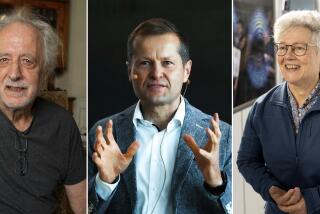World’s Fastest Transistor Is Unveiled
- Share via
URBANA, Ill. — A new transistor designed at the University of Illinois is the fastest in the world and should improve supercomputers and communication systems, the university said Thursday.
Electrical engineer Hadis Morkoc, who led the team that designed the transistor, said the new electronic device should allow more information to be transmitted to and from satellites, and it should allow reception of very low-level radio signals.
“The signal coming back from a spacecraft light years away from Earth is very weak, but with something like this, you could detect it,” he said.
Military communications could be transmitted at such low levels that the enemy could not intercept them or pinpoint the location of the transmitter, he said.
“The performance is better than any other transistor that has been made to date,” said Phillip Smith, manager of advanced devices at the General Electric laboratory in Syracuse, N.Y., where the transistor was fabricated and tested. Smith said GE probably would refine the new transistor, then produce it for use in the company’s own communication products rather than sell the transistor itself.
Once in commercial production, the new transistor could be twice as fast as today’s best transistor, Morkoc said. Since transistors are essential to the operation of supercomputers, the new transistor should allow even faster processing of data, he said.
Transistors control the flow of electric current. Unlike the large ones that first made transistor radios possible, modern transistors are tiny. Thousands can be embedded in computer chips smaller than a fingernail.
In sophisticated communication devices, Smith said power output and efficiency are important for sending a signal, and a low noise level is important in receiving a signal. He said the new transistor is superior in those areas to any on the market.
“The important thing now is to establish reliability--look for failure and make sure it won’t burn out too quickly,” said Smith, who estimated that testing could take one to two years.
Morkoc said improving the transistor was similar to trying to reduce the time it takes to get an automobile from one point to another.
“We couldn’t change the car because, in our case, it is the electron,” he said. “So we improved the road.”
The university researchers added a metal called indium to the gallium arsenide that has been used as a semiconductor in many transistors. The result was a new transistor twice as fast in the laboratory as the best comparable transistor, he said.
The results were given to GE scientists, who fabricated a commercial size transistor--about 75% smaller. That, in effect, meant not only a better road but a shorter one, Morkoc said.
More to Read
Sign up for Essential California
The most important California stories and recommendations in your inbox every morning.
You may occasionally receive promotional content from the Los Angeles Times.











